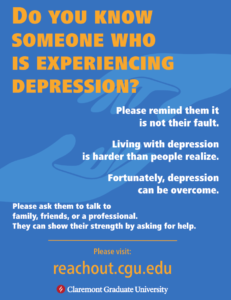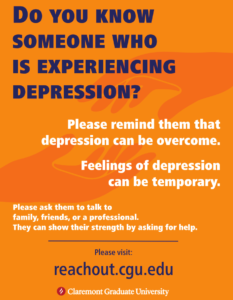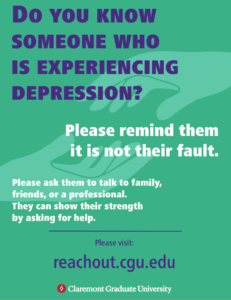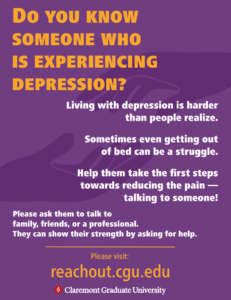Dear visitor:
If you are reading this letter, you likely know someone who is experiencing depression. I know firsthand how painful feelings of depression can be. I also know that it is possible to recover and flourish.
I graduated with my Ph.D. nearly 20 years ago, but there are some things that are not easily forgotten. Instead of taking midterms during my first semester of graduate school, I was in the hospital due to a severe bout of depression. It was one of the more difficult times in my life. I thought my graduate school career was going to be over before it started. As I am currently a full professor with tenure, that was clearly not the case.
As you know, someone who is experiencing depression is not at fault for how they feel and they are likely trying harder than anyone realizes to overcome their feelings of depression. You also likely know that feelings of depression can often be overcome; however, it is possible that the person experiencing depression does not realize that others see depression in this manner.
If you know someone who is experiencing depression, they might not be able to reach out for help, or maybe they have reached out to you and you are not sure how you can help. It is my hope that this site will provide resources for those who wish to help their fellow graduate students. There are many different options available when it comes to offering guidance and directing your fellow graduate student to a place where they can seek help. Everyone will have different preferences when it comes to help-seeking. Accordingly, a range of different options are provided.
First and foremost, if your fellow graduate student is unsure if they are indeed experiencing depression, an anonymous mental health screening tool can be found here:
http://screening.mentalhealthscreening.org/claremont
Likewise, if you know someone struggling with their mental health, let them know that CGU is committed to promoting psychological wellness for all students. 7C Health (TimelyMD) is a convenient way for them to receive FREE medical and mental health support virtually 24/7 (the link is directly below). They can get connected and talk about anything from school stress to relationships.
https://timely.md/schools/index.html?school=7chealth&
If your fellow graduate student would like to talk to someone, the Dean of Students provides a list of various helplines. Hopefully, there will be one your fellow graduate student will feel comfortable calling:
They can also visit www.suicidepreventionlifeline.org, or call 988.
Of course, some people prefer to text rather than talk. If that is the case for your fellow graduate student or loved one please ask them to text “HOME” to 741741. Or, you can chat from your computer by going here:
https://suicidepreventionlifeline.org/chat/
For those who identify as LGBTQ+, the Trevor project provides information and support to LGBTQ+ young people 24/7, all year round. They can also visit https://www.lgbthotline.org/national-hotline.html, which supports all LGBTQ+ adults.
If you’d like to read about how to provide support to your fellow graduate student or loved one who is experiencing depression, this link will provide you with great information on how to do so:
https://www.nami.org/Find-Support/Teens-Young-Adults/How-to-Help-a-Friend
If your fellow graduate student would like to talk to someone, the Dean of Students provides a list of various helplines (e.g., National Suicide Prevention Lifeline 800-273-TALK [8225]). Hopefully, there will be one your fellow graduate student will feel comfortable calling:
https://my.cgu.edu/dean-of-students/
In closing, if you know a fellow graduate student experiencing depression please remind them that it is not their fault and that feelings of depression can be overcome. As someone who has experienced depression, I know that it is often harder than most people realize, but there is hope and there is help available. Please let your fellow graduate student know that they are not alone, that it is possible to experience depression in graduate school and still thrive in the long run. It takes strength to seek help, but it is the first step toward recovery.
Sincerely,
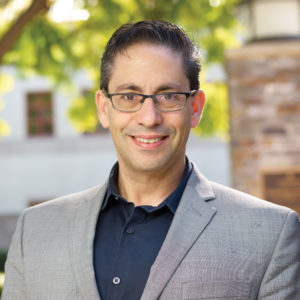
Jason T. Siegel
Professor of Psychology
Chair, Social Psychology Program
Co-Director, Institute of Health Psychology and Prevention Science
School of Social Science, Policy & Evaluation
Claremont Graduate University
